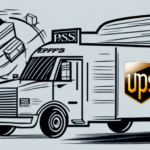DHL eCommerce vs FedEx
In today's global market, shipping and logistics companies play a crucial role in enabling businesses to deliver products to customers efficiently. Two major players in this industry, DHL eCommerce and FedEx, are popular choices for businesses of all sizes. This comparison provides an in-depth analysis of their services, helping you make an informed decision for your business needs.
Network Coverage
Global Reach
DHL eCommerce operates in over 220 countries and territories worldwide, making it one of the most extensive shipping networks globally. This robust presence allows businesses to reach a vast customer base without worrying about shipping restrictions.
Similarly, FedEx extends its services to over 220 countries and territories, offering comprehensive coverage for businesses requiring broad network reach. Both companies ensure reliable delivery through their expansive global infrastructures.
Regional Strengths
DHL eCommerce has a particularly strong presence in Asia and Europe, making it an ideal choice for businesses looking to expand their eCommerce operations in these regions. Their investment in local facilities ensures efficient handling and delivery.
Conversely, FedEx boasts a more extensive network in North America, especially in the United States and Canada. This makes FedEx a preferred option for businesses primarily operating within these markets.
Delivery Services and Tracking
Delivery Speed
Delivery speed is a critical factor for eCommerce shipments. DHL eCommerce offers flexible delivery options, including standard (5-7 business days), expedited (2-3 business days), and express (1-2 business days) services. This range allows businesses to cater to customers with varying delivery expectations.
On the other hand, FedEx provides similar delivery options, with expedited services delivering within 1-3 business days. Additionally, FedEx offers same-day delivery for urgent shipments, ensuring time-sensitive deliveries meet customer expectations.
Tracking and Visibility
Effective tracking is essential for managing shipments. DHL eCommerce provides comprehensive tracking capabilities through its online portal, allowing businesses to monitor packages in real-time. Automated notifications via email or SMS keep customers informed about their order status.
Similarly, FedEx offers advanced tracking features with real-time updates and delivery notifications. FedEx's tracking system integrates GPS technology for enhanced visibility of high-value shipments.
Special Services
Both DHL eCommerce and FedEx offer special services to enhance customer experience. DHL eCommerce includes same-day delivery, package pickup, and signature confirmation services. These options provide added convenience and security for high-value or time-sensitive shipments.
FedEx offers delivery customization, scheduled deliveries, and Saturday delivery services, allowing businesses to tailor shipping options to specific customer requirements.
Pricing and Costs
Shipping Costs
Pricing is a significant consideration for businesses. DHL eCommerce employs a pricing strategy based on package weight and destination zones. They offer competitive rates, especially for businesses shipping large volumes of low-value items, making it a cost-effective option for eCommerce businesses.
FedEx follows a similar pricing model, with rates determined by package size, weight, and destination. While FedEx's pricing is generally higher, they provide a broader range of services and faster delivery options, which may justify the cost for businesses prioritizing speed and service variety.
Packaging and Insurance
Both companies require adherence to specific packaging guidelines to ensure safe delivery. DHL eCommerce mandates that packages are tightly packed, well-cushioned, and made from durable materials. Proper labeling and inclusion of necessary customs documentation are essential for efficient shipping.
FedEx similarly requires sturdy boxes, cushioning materials, and clear labeling. In terms of insurance, DHL eCommerce offers coverage ranging from $100 up to $5,000 per package, with options for additional coverage based on shipment value. FedEx provides insurance coverage from $100 up to $50,000 per package, offering higher coverage limits for high-value shipments.
Customs Clearance
Handling customs clearance efficiently is crucial for international shipping. DHL eCommerce offers comprehensive services including document preparation and brokerage handling, ensuring timely clearance of packages.
FedEx provides similar customs services, assisting businesses in navigating complex regulations. Their Duty and Tax Paid (DTP) and Duty and Tax Unpaid (DTU) options offer flexibility depending on the business's and customer's preferences.
Customer Service and Support
Effective customer service can significantly impact the shipping experience. DHL eCommerce delivers extensive customer support options, including 24/7 online and phone assistance, and a dedicated eCommerce customer service team that is responsive and knowledgeable.
FedEx also offers robust customer service through online chat, phone support, and email assistance, available 24/7. While both companies provide excellent support, customer reviews indicate that DHL eCommerce may have a slight edge in resolving complaints more efficiently.
Conclusion
Choosing between DHL eCommerce and FedEx ultimately depends on your business's specific needs. DHL eCommerce excels in international shipping, especially in Asia and Europe, offering competitive pricing for bulk shipments and strong tracking capabilities. FedEx provides a wider range of services, faster delivery options, and a robust presence in North America, making it suitable for businesses prioritizing speed and service diversity.
Consider factors such as network coverage, delivery speed, pricing, tracking, customs services, and customer support when making your decision. By carefully evaluating these aspects, you can select the shipping provider that best aligns with your business objectives and customer expectations.




















